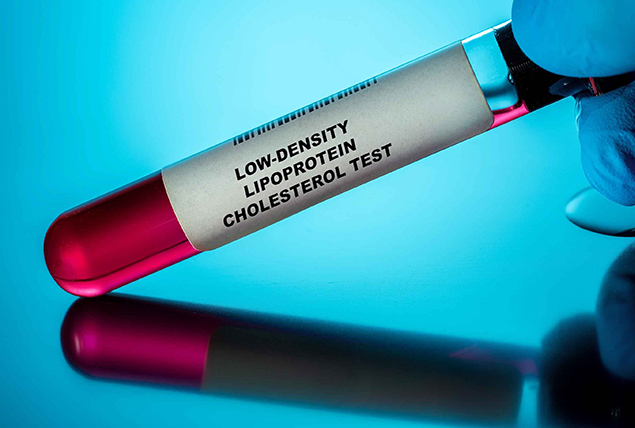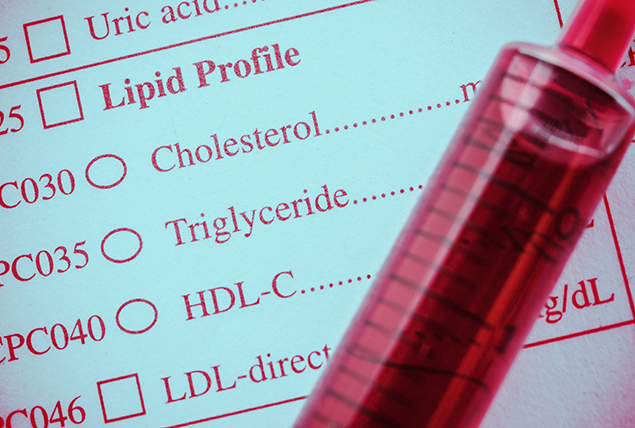How Does High Cholesterol Affect Your Overall Health?

Key Points
- High cholesterol alone is asymptomatic, which means you may have elevated cholesterol for years without ever being aware that it's an issue.
- Pregnancy is one time when an increase in blood cholesterol levels is expected and desired.
- There is a clear link between erectile dysfunction, sexual health and high cholesterol.
High cholesterol is closely associated with heart disease. If you've just been diagnosed with high cholesterol, you likely have questions.
Educate yourself on the potential associated risks of high cholesterol levels so you can be on the lookout for signs and symptoms that could indicate more serious health problems.
Why is heart health and high cholesterol linked?
High cholesterol alone is asymptomatic, which means you may have elevated cholesterol for years without ever being aware that it's an issue. Unfortunately, this can lead to serious damage to the blood vessels and heart.
"When your cholesterol is high, the extra fat deposits into various blood vessels in your body," said Teresa Lovins, M.D., FAAFP, and board member of the American Academy of Family Physicians (AAFP). When they deposit in the heart blood vessels there can be an obstruction that keeps your blood from flowing to the heart muscle, ultimately causing an injury or heart attack."
This isn't something to take lightly.
As Karen Smith, M.D., FAAFP, and AAFP board member points out, data from the Centers for Disease Control and Statistics (CDC) indicates that heart disease is the leading cause of death in the United States across sexes, races, and ethnic groups.
Almost 700,000 people in the United States died from heart disease alone in 2020, with an annual cost of about $229 billion.
"High cholesterol is a major risk factor for the development of atherosclerotic cardiovascular disease (ASCVD). A high-fat diet contributes to the buildup of cholesterol and triglycerides in the bloodstream that eventually stick to the inside walls of the arteries," Smith said.
"These fatty plaques begin to occlude circulation of blood. The lack of blood flow to regions of the body such as the heart or brain can result in heart attack or stroke."
Just because you've been diagnosed with high cholesterol doesn't necessarily mean you're also affected by plaque buildup or heart disease. What it does mean is that you're at higher risk, and you should talk to your doctor about ways to assess and manage your risk.
"Your family physician can estimate the impact of high cholesterol with data such as blood pressure, lipid panel, the medications you use, whether you smoke, and your family history and demographics," Smith said.
"The ASCVD Risk Estimator Plus is a great way for you and your doctor to discuss a plan to decrease the chance of vascular disease."
She noted that your doctor will likely help develop a management plan which may include additional diagnostic testing, such as a cardiac stress test or carotid artery tests to determine whether you need additional intervention beyond lifestyle changes to diet and exercise.
Other symptoms could indicate that you have a partial blockage in your blood vessels.
"There are times when the blockage isn't complete, but when you try to exercise, the blood vessels cannot increase the blood flow to the heart. When this occurs, we call this angina with exercise," Lovins said.
"If you know your cholesterol levels are high and you experience any limitation in your exercise from chest pain or leg pain, it could be from blockage in the blood vessels. In this scenario, it would be a good idea to talk to your physician about whether further heart or blood vessel testing would be appropriate," Lovins finished.
How does high cholesterol affect pregnancy?
Pregnancy is one time when an increase in blood cholesterol levels is expected and desired, indicated a 2011 report. This occurs because the growing fetus needs extra fat (supplied by the mom) to grow and develop normally within the uterus.
"During pregnancy, the baby uses the fats from mom's blood to help with growth and development. Because of this, the levels of cholesterol and triglycerides rise while a woman is pregnant. Cholesterol also is used to help make the hormones a woman needs for pregnancy, like estrogen and progesterone," Lovins said.
"This elevation is temporary and will return to pre-pregnancy levels after birth or the end of breastfeeding."
Because this increase in cholesterol is expected, Lovins explained that it's not recommended to test cholesterol levels during pregnancy.
The exception is for those women who had pre-pregnancy hyperlipidemia, a condition in which there are high levels of fat particles in the blood.
If you know you have high cholesterol before you become pregnant, and especially if you're taking medications for your cholesterol, talk to your doctor about the best course of action.
"Some medications used for the treatment of high cholesterol are not advised during pregnancy, said Mary Campagnolo, M.D., MBA, FAAFP, and board member of the AAFP. "This should be handled on an individual basis with the patient's physician, along with emphasis on eating a heart-healthy diet and staying physically active during pregnancy."
Recommended
- The Facts About High Cholesterol: Find out how high cholesterol affects your sexual health.
- A High Cholesterol Level Often Goes Undetected: No set cholesterol level requires medication. Diagnosis and treatment are individual.
- I Had a Mild Heart Attack. Can I Safely Have Sex Again?: An intercourse-induced infarction is rare, but other factors affect post–heart attack intimacy.
What's the association between mental health and high cholesterol?
It may come as a surprise that there's some connection between cholesterol levels and mental health. But as with most things, the links that exist between physical health symptoms, changes to hormone levels and emotional symptoms related to health conditions are intricately intertwined.
What might be even more remarkable is that the clearer link between cholesterol and mental health isn't related to high levels of cholesterol. Instead, it's that low cholesterol levels that may be more of a concern.
"There are some studies that correlate lower total cholesterol levels with an increase in depression, impulsivity, and suicide," Lovins said. "One of the hormones we know that affects depression is serotonin. When your total cholesterol and LDL—that is, low-density lipoproteins, or "bad" cholesterol—are too low, serotonin isn't produced and this is thought to put a person at risk for depression."
More recent studies indicate that this link is unclear or unproven and that more studies are needed to understand what the connection might be (or even if there is a connection at all).
Campagnolo noted that there's some indication that individuals who have behavioral health conditions related to mental health are at higher risk of cardiovascular events.
"Measurement of lipid profiles [cholesterol readings] shouldn't be overlooked in people under treatment for behavioral health conditions," she said. "These should be managed with recommendations for a heart-healthy diet, regular exercise and cholesterol-lowering medications, as appropriate."
Is erectile dysfunction and high cholesterol linked?
While the jury is still out regarding the link between mental health concerns and high cholesterol, there is a clear link between erectile dysfunction, sexual health and high cholesterol.
So if you're experiencing a lagging sex drive or changes in sexual performance, it's worth considering a visit to your healthcare provider to check whether it could be associated with high cholesterol levels.
High cholesterol levels can affect sexual health directly and indirectly.
"High cholesterol impacts sexual health by causing decreased blood flow to the pelvic region of the body where sexual organs are located," Smith said.
"This is a direct effect, but sexual activity can be indirectly diminished if heart, muscle and brain function are hindered as a result of cholesterol plaque associated heart disease that results in low stamina."
Specifically, she pointed to erectile dysfunction as a complication that can arise in response to a combination of disorders including high cholesterol and triglycerides, diabetes, high blood pressure and smoking.
"Your family physician uses patient questionnaire tools, such as the International Inventory of Erectile Dysfunction (IIEF) to better understand the effects of erection problems in sexual activity," Smith said.
While you may not be overly excited to bring up erectile dysfunction to your doctor, enlisting their help can be good for overall health.
"The information obtained leads to a patient-physician conversation opportunity for not only improving sexual relationships but overall wellbeing with the achievement of good physical and mental health," Smith said.
Complications and related conditions
High cholesterol is a known risk factor for heart disease. Take control and manage the condition for long-term health.
If you fail to make lifestyle changes, or if the lifestyle changes you make don't result in the desired cholesterol-lowering results, you could end up managing much more serious health problems in the long run.
"A few weeks ago, one of our patients presented with the complaint of a 'painful blue great toe,'" Smith said. "As a family physician of 32 years, the alarms went off resulting in several questions leading to the most plausible diagnosis of peripheral vascular disease with loss of circulation to the toe."
"A history of high cholesterol, diabetes, hypertension and smoking are the common grouping of disorders that lead to ischemia or loss of blood flow. Ischemia can occur anywhere in the body, including the brain, manifested by a stroke, the heart, leading to a heart attack, and in this situation, the lower extremities of the body," Smith said.
Depending on the severity of ischemia—a serious problem where parts of your body, like your heart or brain, aren't getting enough blood—outpatient or inpatient surgeries may be required.
In addition to heart attack, stroke and ischemias, Smith noted that individuals who have experienced high cholesterol over a long period may experience xanthomas (also known as skin lipid plaques) on the face, in the arteries of the eyes, kidneys, sexual organs (such as the penis) and the liver.
A fatty liver ultimately can lead to cirrhosis.
"There are a myriad of signs and symptoms related to loss of circulation, but the most common and severe are heart attack and stroke," she said.
What should you know about your high cholesterol diagnosis?
While this may all seem overwhelming and scary, you should view a diagnosis of high blood pressure and/or high cholesterol levels as the first step in the right direction and an opportunity to begin reclaiming your health.
"The diagnosis of high cholesterol is the opportunity to review and understand where the plaque-laden process may have started and to discuss the best way to slow down the progression," Smith said.
"The goal here is to prevent loss of circulation, improve blood vessel integrity and maintain viable organ function."
Education, along with a management plan developed in conjunction with your healthcare provider, are the best ways to slow or reverse any negative health conditions that may have developed as a result of high cholesterol.
The bottom line
If you proactively approach high cholesterol with lifestyle changes, such as diet and exercise and, with advice from your healthcare provider, a cholesterol-lowering medication, it's completely possible to manage your cholesterol and reduce your risk of developing other related health conditions.


















